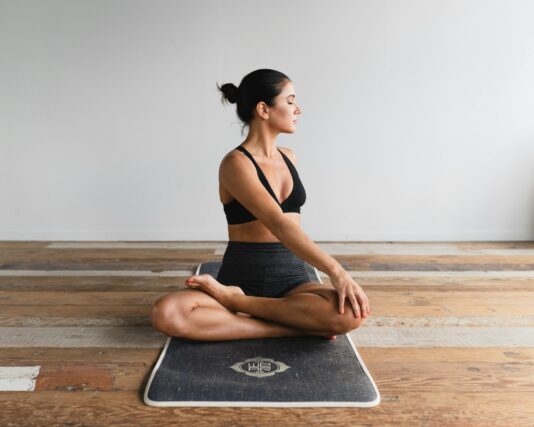If fitness is a big part of your life, missing a workout or skipping a planned training session can trigger serious guilt and anxiety.

Even if you needed the day off or something came up, you chastise yourself for not getting in your calorie burn and end up feeling really bad about it for far too long. Exercise guilt can be draining, making you feel like you’re failing when life gets in the way. But the truth is, finding balance is more important than being perfect. Here’s how to deal with the weird sense of shame and self-reproach that can creep in and build a healthier mindset around staying active.
1. Understand where the guilt is coming from.

Before you can address exercise guilt, it’s important to pinpoint its source. Is it pressure from social media, unrealistic fitness goals, or comparing yourself to others? Understanding what’s fuelling those feelings can help you take the first steps toward overcoming them. Once you figure out the root cause, you can challenge those thoughts. Ask yourself if the pressure you feel is reasonable or if it’s driven by external influences. A bit of clarity can make it easier to reframe your perspective and prioritise your mental health over perfection.
2. Let go of the “all or nothing” mindset.

Many people feel guilty about skipping exercise because they think it’s all or nothing. If you miss a workout, you might feel like you’ve failed completely, but that way of thinking isn’t helpful or accurate. Fitness is about consistency, not perfection. Missing one session doesn’t erase all the progress you’ve made. A balanced approach means recognising that rest days or adjustments are part of the bigger picture, not setbacks.
3. Focus on what you’ve achieved, not what you’ve missed.

When guilt strikes, it’s easy to focus on what you didn’t do, but changing your mindset to celebrate your efforts, no matter how small, can help you feel more positive. Did you go for a short walk or stretch instead of a full workout? That still counts. Recognising the little wins keeps you motivated and prevents you from falling into the trap of self-criticism. Progress isn’t just about big milestones; it’s about all the small, consistent actions that add up over time.
4. Challenge the idea that exercise is punishment.

If you view exercise as a way to “earn” food or “make up” for indulgences, it can create a toxic relationship with fitness. This mindset turns working out into a punishment rather than a celebration of what your body can do. Reframe exercise as an act of self-care and enjoyment. Focus on how movement makes you feel — stronger, happier, more energised — rather than what it’s “fixing” or “making up for.”
5. Set realistic expectations for yourself.
 Source: Unsplash
Source: Unsplash One of the biggest contributors to exercise guilt is setting unrealistic goals. Promising yourself you’ll work out six days a week or hit the gym for an hour every day can lead to burnout or disappointment if life gets in the way. Instead, set achievable goals that fit your lifestyle. Aiming for three sessions a week or incorporating short bursts of movement into your day can feel more manageable and sustainable without piling on unnecessary pressure.
6. Remember that rest is important.
 Source: Unsplash
Source: Unsplash Rest days are a critical part of any fitness routine, not a sign of laziness. Guilt about skipping exercise often stems from the misconception that more is always better, but your body needs time to recover and rebuild strength. Start to see rest as part of your progress rather than a deviation from it. When you honour your body’s need for recovery, you’ll likely perform better during your workouts and avoid overtraining or injury.
7. Stop comparing yourself to other people.
 Source: Unsplash
Source: Unsplash Social media can make it feel like everyone else is hitting the gym daily or running marathons, but what you see online isn’t the full picture. Comparing your routine to someone else’s is unfair and unhelpful. Your fitness journey is unique to you, and that’s what matters. Focus on what works for your body, schedule, and goals, rather than trying to keep up with someone else’s highlight reel.
8. Incorporate movement into your day naturally.

If guilt over missing structured workouts is weighing on you, look for ways to move your body in a more organic way. Walking to the shops, taking the stairs, or even dancing around the kitchen can all count as exercise. Approaching it in this way makes movement feel less like a chore and more like a natural part of your day. It’s a reminder that fitness doesn’t have to happen in a gym or follow a rigid plan to be beneficial.
9. Be nice to yourself — you deserve it.

It’s easy to be hard on yourself when you miss a workout, but self-compassion is key to building a healthy relationship with exercise. Instead of criticising yourself, try speaking to yourself as you would a friend who’s struggling. Recognising that you’re human and that life is unpredictable can help you let go of the guilt and focus on what’s next. Treating yourself with kindness makes it easier to stay motivated and balanced.
10. Focus on how you feel, not how you look.

Exercise guilt often stems from focusing too much on external outcomes, like weight loss or appearance. Flipping your focus to how exercise makes you feel (strong, energised, or less stressed) can be a game-changer. When you prioritise the mental and emotional benefits of movement, it becomes less about meeting an aesthetic goal and more about enhancing your overall well-being.
11. Don’t let one missed workout spiral into more.

Missing a session doesn’t mean you’ve lost momentum or that your routine is ruined. Avoid letting one missed workout turn into an excuse to skip the rest of the week — it’s a common trap many fall into. Instead, see it as a temporary pause. Picking up where you left off is far more beneficial than dwelling on what you didn’t do. Progress isn’t linear, and that’s okay.
12. Find workouts you actually enjoy.
 Source: Unsplash
Source: Unsplash If exercising feels like a chore, you’re more likely to feel guilty when you skip it. The solution? Find things you genuinely look forward to doing, whether it’s yoga, cycling, swimming, or even walking the dog. When you enjoy what you’re doing, it stops feeling like a box to tick and becomes something you’re excited to make time for. It can definitely reduce guilt and help you build a routine you’ll actually stick to.
13. Celebrate balance, not extremes.

Fitness isn’t about pushing yourself to the limit every single day. It’s about finding a balance that works for you—one that includes rest, flexibility, and enjoyment alongside your workouts. By celebrating balance, you can let go of the idea that missing a session is a failure. Instead, focus on creating a lifestyle that supports your health and happiness in the long term. Exercise guilt can feel overwhelming, but it doesn’t have to control you. By challenging harmful mindsets, practising self-compassion, and prioritising balance, you can create a healthier relationship with fitness — one that’s rooted in positivity and sustainability.




